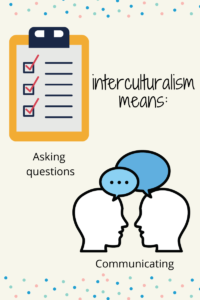With technology and globalization, the workplace is rapidly changing. The time is gone when job seekers were limited to a single geographical location. Today, recruiters are exposed to a global talent pool to select from. This means different races, ethnicities, backgrounds, and languages working in the same team. With such major changes, sticking to traditional ways of recruiting can hurt rather than benefit a workplace, especially where there are goals to build a global team. It is high time that recruiters face the realities of the talent market and realize the need for interculturalism competencies. And not just competencies: they need more experience with different cultures and a better understanding of candidates they’ll be meeting. Here are five reasons that recruiters should seek to learn and understand more about interculturalism.
Diversity and inclusion
A diverse team is no longer a “good” thing to have, it’s a necessary thing to have. Besides helping you improve your reputation in society, there are several business benefits that having people from different backgrounds presents. This is sometimes referred to as diversity hiring and we have looked at the pros and cons in the past. Let’s focus on the postives.
For starters, a global team can serve a global clientele better, which is good for profits and business growth. At Aktor, we have firsthand experience with just how valuable an international team can be. Additionally, different people bring to the table different experiences, mindsets, perspectives, skills, and more. Moreover, these have the power to enhance creativity and innovation in the workplace. Problem-solving is enhanced, which leads to increased productivity. However, to realize these benefits, you have to build a diverse team first. And, understanding different cultures makes this easy for recruiters. It can be a great weapon against implicit bias during recruitment, which paves the way for diverse people to find a place on the team.
Communication

Determining the right questions
How people perceive work can be different in different cultures, and so is what motivates different people. Determining how people from different cultures perceive such things during the hiring process can only take a deep understanding of the candidates’ local cultures. Additionally, you have to ask the right and appropriate questions to avoid the cultural nuances that can offend the interviewees. For instance, it is common to ask candidates if they would be proud to work with the company they are interviewing for. However, while the U.S culture would appreciate such a question, it might be inappropriate for cultures that are proud of the people and not necessarily the company.
Finding the right fit
Building a positive company culture is essential for business growth. Moreover, where diverse teams are involved, having team-building exercises that bring people together enhances understanding and relationships. However, your efforts to build a positive company culture start with finding the right fit from the word goes. Recruiters need to understand how well candidates can fit in the culture. This involves determining different things such as how candidates resolve conflicts, how they react to different feedback, what motivates them, how they perceive teamwork, and much more. All these aspects are likely to vary from culture to culture. Culturally aware recruiters are likely to make the best decisions about the candidates.
Onboarding
The onboarding process is important in ensuring that the candidate feels welcome in an organization and becomes a part of the home away from home family. However, recruiters need to understand that people have probably worked in different cultures, and might very well be coming from a different culture. Recruiters, therefore, have the task of minimizing culture shock for new hires. The last thing needed is for people to start leaving even before they start working simply because they couldn’t handle the shock or couldn’t fit in. Interculturalism competence helps recruiters find ways to create an onboarding process that addresses such issues. Onboarding is often overlooked but it’s probably one of the most useful steps of the recruitment process. It can be used as a learning experience for the company because candidates navigate the company without necessarily staying and by analysing those dropouts, you can prevent it in the future.
Conclusion
The recruitment process is an expensive affair. That is why it is important to get it right the first time around. Now that recruitment is taking a new shape with the global talent pool, embrace interculturalism! Moreover, acquiring more skills from all over the globe is critical for recruiters who want to demonstrate diversity and inclusivity in the workplace.
Author: Ali Neill
As the job board tester and blog editor for the Jobboard Finder, Ali works on job boards from all around the world and keeps a close eye on the recruitment trends thanks to a number of sources, including the website’s social media pages.
« 6 Tips for Better Time Management for Recruiters
How Recall Bias Impacts Recruitment »


Informative blog! it was very useful for me. Thanks for sharing. Do share more ideas regularly.
Village Talkies, a top-quality professional corporate video production company in Dubai and also the best explainer video company in Dubai, 2D animation video makers in Dubai, 3D animation studio in Dubai, Abu Dhabi, UAE, India, and Houston, Dallas, Texas, provides 2D, 3D animation videos, corporate films, event, marketing, safety animation videos, and training videos. As the best 3D animation agency in Dubai and 2d animation company in Dubai, product video makers in Abu Dhabi, we also offer 2D, 3D cartoon & character animations, healthcare and medical videos, CGI, VFX, kids nursery animations, whiteboard explainer videos, and more for all start-ups, industries, and corporate companies. From scripting to corporate, explainer & 3D, 2D animation video production, our solutions are customized to your budget, timeline, and company goals and objectives.